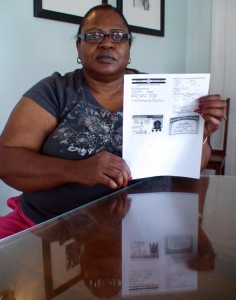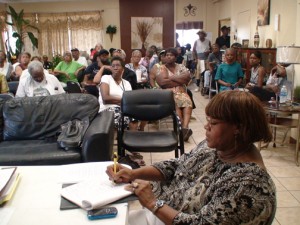By Brett Bursey
Director, SC Progressive Network
When I saw Rep. Alan Clemmons’ guest column in The State, “Voting problems continue to haunt us” (July 21), I was hoping he’d explain his part in peddling the myth of dead people voting in South Carolina, and apologize to the people he misled. He did neither.
Instead, he again claimed an “undeniable presence of election fraud in South Carolina,” and took a cheap shot at the S.C. Progressive Network to make his point. He referenced an instance years ago when bogus forms were turned in by someone the network hired to do voter registration in Florence County. I caught the fraud myself and called SLED and the County Election Board the day the forms were submitted.
No fraudulent votes were cast. I testified against the perpetrator, and he went to jail. The system worked.
Clemmons’ column goes on to call the photo ID law he championed “a good first step” and said, “Now, to cast a ballot, you are required to prove who your are and that you are eligible to vote in that election.”
The truth is that Clemmons’ bill was interpreted — essentially rewritten — by the federal appeals court, which ruled that “South Carolina’s new law … does not require a photo ID to vote.” The state spent $3.5 million on private attorneys to defend a law against a problem that doesn’t exist — and lost.
While unable to cite a single case of in-person voter impersonation, Clemmons told the U.S. Department of Justice that “voter fraud in South Carolina is an unspoken truth.” Still today, he conflates absentee ballot and voter registration fraud, neither of which requires a photo ID, with in-person fraud at the polls, of which there is no evidence.
In the nine years Clemmons has chaired the House’s Election Laws Subcommittee, he has killed every bill the network’s legislative members have sponsored to broaden voter participation. He nixed our proposals to establish early voting centers and high school voter registration programs, to reduce the influence of money in elections, to re-enfranchise felons and to adopt voter-verified paper ballots.
Rather than working to make voting more accessible and inclusive, Clemmons has said voting should not be easy.
We do agree on one thing: South Carolina’s election system is dysfunctional. It was established by the 1895 state constitution, which reversed the democratic aspects of the 1868 constitution that empowered black citizens. It delegated authority to 46 county election boards, appointed by local legislators, with no centralized control.
County election boards interpret and enforce election laws differently, and are not accountable to the State Election Commission.
Clemmons proposes to fix the problem by putting the State Election Commission under the partisan office of secretary of state. But in Florida and Ohio, where they run elections, secretaries of state have been accused of disenfranchising thousands of voters.
More partisan control in a state already crippled by it would be a mistake. A better answer would be to empower our independent, nonpartisan State Election Commission to run elections.
The truth is, our democracy is not threatened by voter fraud but by legislators who have rigged the system. Around 10 percent of eligible voters are choosing our Legislature.
If Clemmons was truly concerned about the “sanctity” of our electoral system, he would address the fact that the S.C. Legislature has the least-competitive elections in the nation, with 80 percent of lawmakers elected with no general-election opposition.
Clemmons, for example, got 99.12 percent of the vote in 2012, when he was the only candidate on the ballot. He was swept into office by 6.1 percent of voters in his district.
The Network believes we can do better. We will continue to fight to make our democracy more representative, and invite anyone who shares our goal to join us. Call us at 803-808-3384, email us at network@scpronet.com, or find us Facebook or Twitter.


